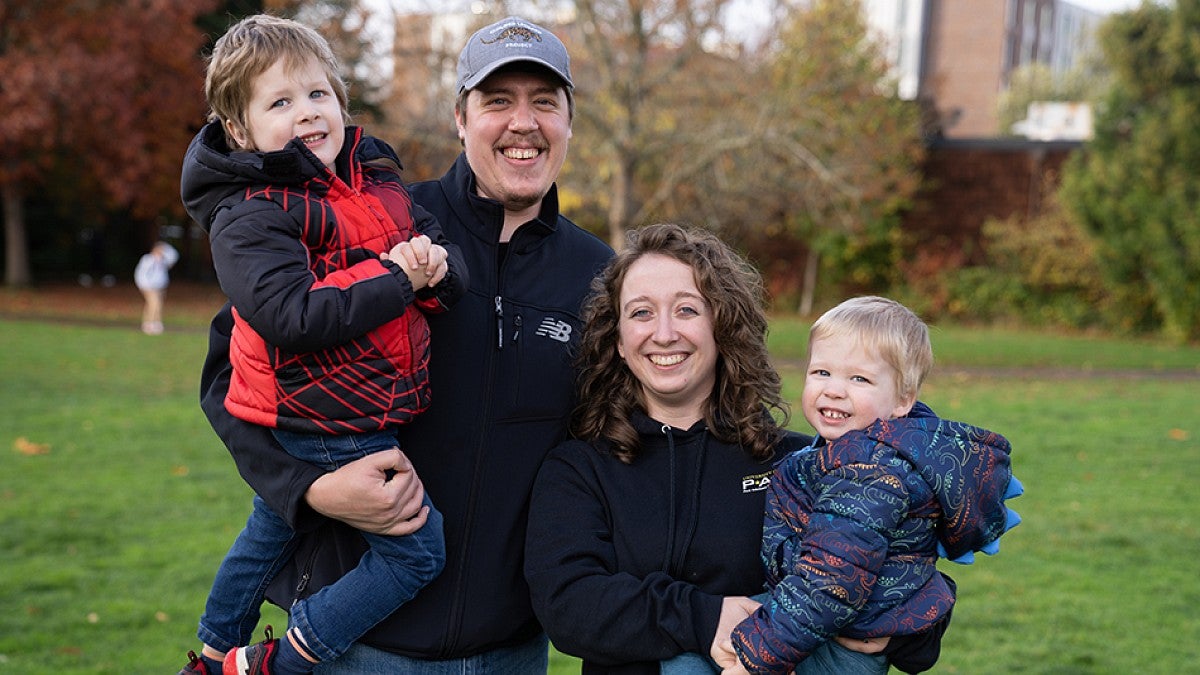Mia McCall served four years in the U.S. Army before coming to the University of Oregon in 2019, and it wasn’t an easy transition, especially since she had given birth to her second child just a month before starting school.
“It was pretty difficult,” she said. “It was very isolating, just being here and trying to understand my place among my peers.”
Then someone told her about the Student Veterans Center at the Erb Memorial Union, which provided a space for her to talk with other veterans about their shared experiences.
Today, McCall is a regular presence at the center, serving as team leader for Peer Advisors for Veteran Education, which works with veterans on campus to provide peer support, help them navigate college life, identify resources and provide a sense of community.
McCall has been leading PAVE since February, when things were still very much virtual on campus and it was a challenge to connect with people. She said it’s been nice this fall to be able to meet people in person.
She and her husband, Joel McCall, also an Army veteran, fit the definition of nontraditional students, and their experience at the UO is unlike that of the typical student who arrives straight from high school. For one, they’re older — Mia is 25 and Joel is 28 — and they are parents of two young children, David, 4, and James, 2. They also come from a demanding, structured organization to a college campus where students are left to their own devices to organize their time and studies.
“I was never this studious in high school,” Joel McCall said. “A couple of years in the military has really helped with that.”
He said one of their biggest differences from traditional students is family responsibilities. With both enrolled in classes, and Mia with her PAVE responsibilities, things can get tricky if one of their children develops a cough and and has to stay home instead of day care, at the Moss Street Children’s Center.
Then they have to decide, “Who’s going to skip class today because the kids are sick,” Mia McCall said.
They haven’t yet made it to a football game, and it’s not because they’re not interested; it’s just too complicated to juggle with two young children to care for.
Mia grew up in Puyallup, Washington, and comes from a military family. In fact, she and her mother enlisted in the Army on the same day. She was a signal systems specialist, working on communication devices.
Joel McCall served 6½ years in the Army, working as an intelligence analyst, sifting and filtering raw intelligence and presenting relevant data to his command.
They are among about 250 veteran students at the UO, along with another 463 military affiliated students, including Reserves, National Guard, active duty and dependents, according to Maria Kalnbach, coordinator for nontraditional and veteran student engagement and success.
In the most recent U.S. News and World Report rankings, the UO ranked 58th among the best colleges for veterans, a jump of 10 places from the previous year.
The McCalls met while both were stationed at Joint Base Lewis-McChord in Washington and his company was attached to her brigade for a training exercise.
Mia McCall said she came to the UO in part because of Joel’s family, who are native Oregonians and hard-core Duck fans. She’s studying art with a minor in sociology and is interested in becoming an art therapist.
She said she had one early, negative interaction with a nonveteran student, who made a disparaging remark about veterans.
“Besides that, it’s been overwhelmingly positive,” she said. Most of the people she interacts with “are just really overwhelmingly excited about being involved with the vet center.”
Joel McCall is in his first term at the UO, studying computer science. He said the transition to college life has not been all smooth sailing but generally has gone well. Having the Student Veterans Center as a resource has been helpful, he said.
“I love the place. I love the people there,” he said. “Most of the friends I’ve made have been from the vet center.”
Mia said she enjoys being the PAVE team leader, especially now that students are back on campus.
“It’s extremely rewarding,” she said. “I’ve definitely been able to explore options around leadership and get experience in different fields in a safe environment. I have a lot of supportive people behind me.”
—By Tim Christie, University Communications


